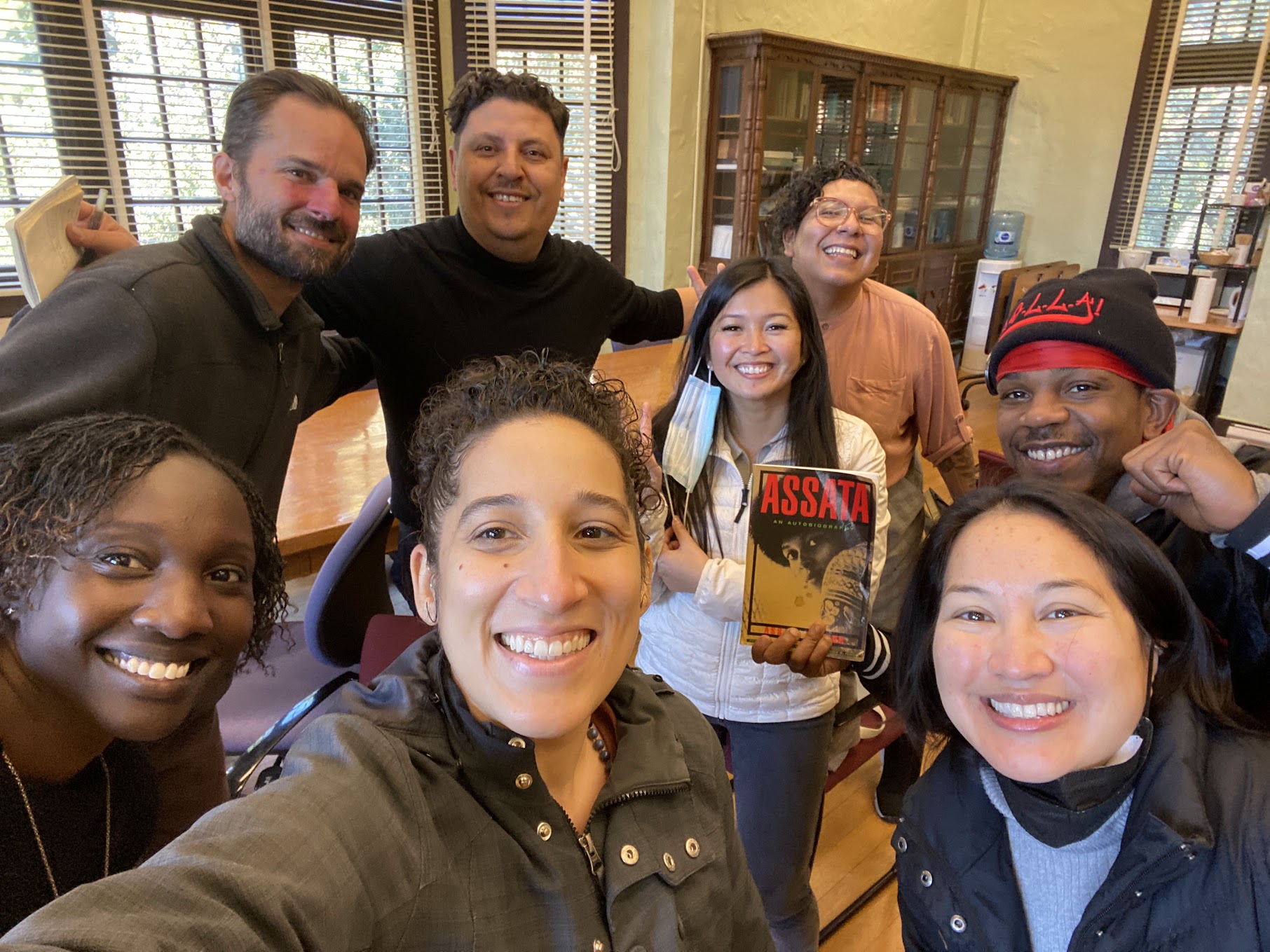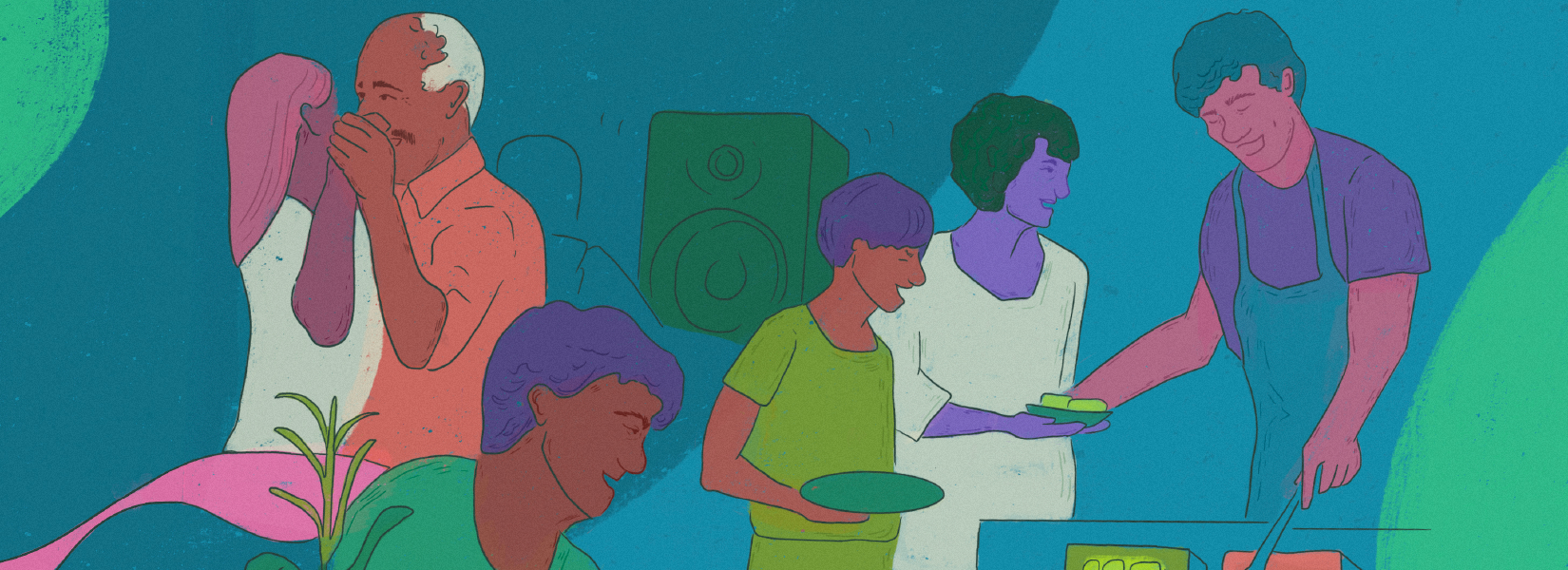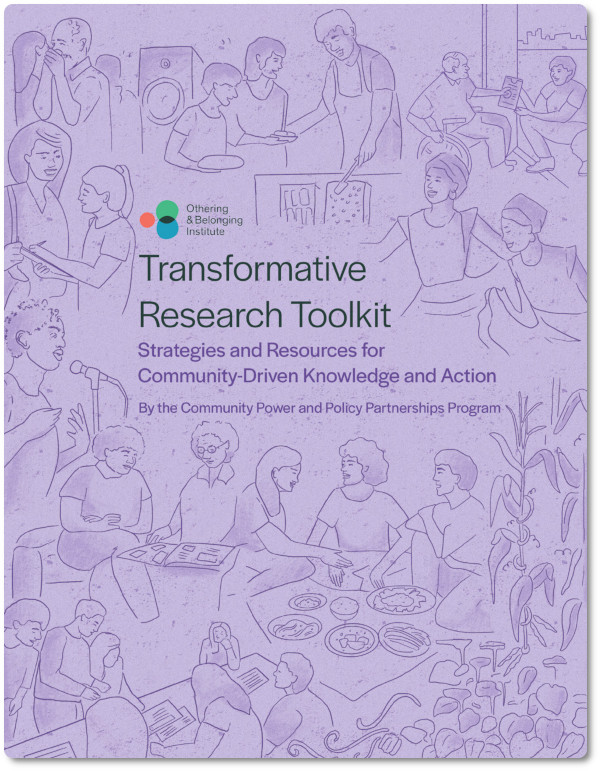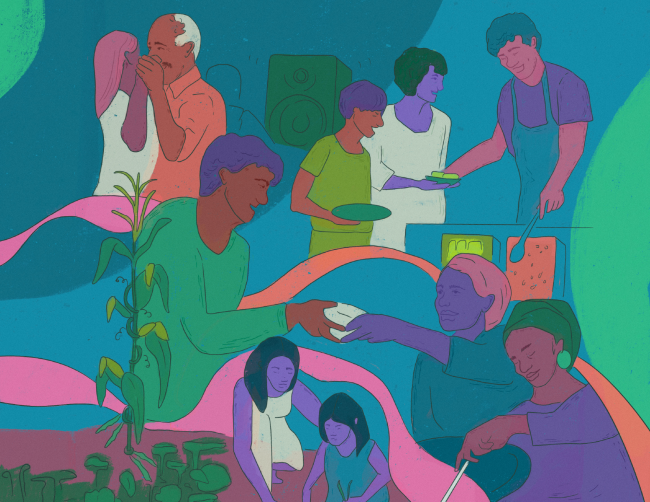Introduction
We have seen and participated in transformative research strategies that defeated proposed jail expansions, won millions of dollars for community-prioritized programs, and built new community-led organizations that changed a political landscape, among many other achievements.
This transformative research toolkit refers to a wide range of processes where people center their lived experience and visions for social transformation, lead a process that systematically builds on this knowledge through investigation and learning rooted in their own ways of knowing, and take action to influence public narratives, policies, and power dynamics. In a nutshell, transformative research is any research process that positively transforms the people directly involved, the communities they are part of, and the structures shaping their lives.
There are various names and frameworks used to describe similar work, which we discuss more fully in the third section, Principles and Frameworks for Transformative Research. When research is reclaimed and redesigned to put community knowledge and collective liberation at the center, it looks different in each place and time. Here we pull together underlying principles, practices, processes, and examples that can help guide new efforts.
This toolkit is intended for cultural workers, organizers, and community leaders. It is designed to support change strategies that involve participatory action research, community organizing, cultural strategy, popular education, or other processes that center local community knowledge. We call it a “toolkit” because its contents are meant to be used to aid individuals’ and communities' work to transform public policy and systems, build power, and shift public narratives. Different tools within will be more useful and better suited to your needs at different times and for different sociopolitical contexts.
We created this toolkit over the last several years as a slow-cook process that boils down experience we’ve had over a couple decades. Many of the toolkit sections were initially created to fill partner requests around research or were generated from discussion about the role of research (positive and negative) in communities. This toolkit is not an evaluation of the specific projects we engaged in over the years, nor does this toolkit speak for those organizations and artists. These offerings are from our experiences and analyses and reflect our perspectives. We share them humbly, knowing you surely have your own to add in. We hope you’ll consider this toolkit as a bag of seeds to contemplate, choose, plant, and cultivate as they best feed you.
Overview
In Part 1, we get into the ideas; in Part 2, we offer more in-depth resources for how to carry out a transformative research process.
Part 1: Understanding Transformative Research
The reasons to be skeptical of anything called “research” are plentiful; what has been done in the name of “research” has and continues to cause countless harms. In the first section, Reclaiming Research, we name the harm that’s been done and offer a list of questions to facilitate conversations on the harm of research. The section then turns to concepts and questions for centering community knowledge and building on people’s own ways of surviving and thriving.
In the second section, Cultural Strategy and Transformative Research, we turn to collaboration with artists and cultural practitioners that broadens ways of knowing to include the knowledge generated through creative and cultural practices. We outline how weaving in cultural strategy strengthens the reach, resonance, rigor, and regenerative potential of transformative research and may also require a shift in the role of the artist.
In the third section, Principles and Frameworks for Transformative Research, we include several principles and frameworks adapted from other practitioners and some of our own. These are core concepts for thinking about an overall research process and situating it in your communities’ values, context, and goals.
Part 2: Tools for Doing Transformative Research
In the fourth section, Planning Your Research Process, we break down the research process into six phases and describe the decisions, resources, questions, and tips you may want to consider in each phase. This can be used to develop your work plan for a transformative research process, which will include the roles, relationships, planning, and activities you will carry out.
The final section of the toolkit, Research Methods, is a deep dive into eight empirical methods for generating knowledge as part of a transformative research process: power analysis, interviews, focus groups and structured discussion, surveys, policy analysis, mapping and spatial analysis, archival research, and ancestral ceremonies. For each method, we give an example of what it can look like, how it’s done, what type of knowledge it can generate, how you can build relationships and people power, what roles and resources are needed, and how cultural strategy can be woven into the process.
Gratitude, Who We Are

We, the coauthors of this toolkit, have learned by doing—“making the road by walking”—to act and reflect on our actions as a collective over the last three years, and separately for many years before that.1
The authors of this toolkit are movement builders, artists, and practitioners of PAR, justice research, cultural strategy, life-affirming approaches, collaborative governance, popular education, and healing justice. We have worked in many sectors: housing, transportation, policy, labor, environmental justice, psychology, public health, communications, academia, dance, poetry, music, visual arts, and more. We are made up of diverse and intersecting identities: Black, Latine, Filipina, white cis and non-binary, queer and straight, spiritual, diasporic, and working class and professional class.
This toolkit is not our work alone, but a reflection of our experiences and relationships, some, but not all, of which we highlight here. As Antonio Gramsci wrote, we are made up of an infinity of traces. It is a process of ever-continuing radical consciousness to create an inventory of these traces and how they shape our lives and work. While it will be impossible to name all of these, we want to recognize in particular the gifts of Parceleras, GLITS, Casa Pueblo, the Village in Oakland, Three Walls, Southwest Folklife Alliance, Highlander Center, Friends of Peralta, Bay Peace, Civic Design Studio, Oakland Street Stylers, Lower Bottom Playaz, Chineze Mogbo, Chandra Christmas-Rouse, Safiya Eshe Gyasi, H.O.L.L.A!, West Oakland Environmental Indicators Project, Safe Return Project, Richmond Listening Project, Sagaree Jain, Tera Johnson, Dalia Yedidia, Nicole Montojo, and Pauline Hassan Burkey.
We offer this toolkit out of deep respect and commitment to community organizers, culture bearers, artists, and knowledge holders who dedicate their lives to building with their communities toward a world that is more full of justice, belonging, and infinite forms of thriving. We hope you find it useful.
Background
This toolkit was developed during three years of supporting and working with organizers and artists doing transformative research connected to the Othering & Belonging Institute (OBI) at the University of California, Berkeley. The projects ranged from using surveys and radio programs to build out community solar projects, to film projects for intersectional disability justice. They included struggles to protect historical queer places, to cross-country road trips that uncover strategies of survival and resilience in unhoused communities, and sports-centered ways of engaging neighborhoods and places through gatherings and oral history.
These research projects were initiated via the Surdna Foundation’s Thriving Cultures program, which supported BIPOC artists across the United States, including Puerto Rico, under the banner of Radical Imagination for Racial Justice. Three justice-oriented research organizations (Othering and Belonging Institute, Southwest Folklife Alliance, and the Highlander Center) were asked to support some of the funded artists and organizations interested in integrating participatory action research (PAR) in their efforts to advance racial justice in systems and structural change. For this reason, the toolkit has a particular emphasis on culture, art, and cultural strategy within PAR and transformative research.
Straddling the pandemic (2020–2023)—and all the related justice movements and struggles those years carried—we dealt with frequent disruptions, shifts in the winds, and the incredible persistence and commitment of freedom struggles. In reflecting on and sharing our experience from this time, we hope to sharpen strategies and open new possibilities for transformation.
While most of our work (the authors of this toolkit) happens outside of formal academia, most of us have been trained, at least in part, in academic settings. This toolkit is also published by and organized within an academic institution. Given this, it is important to think critically and be proactive in addressing how academia continues to shape our work.
Even if no one on your research team is an academic or trained in academia, there are likely norms of rigor, validity, and foundational truths that have been inherited from the white, cis-male, Euro-American-centric academic culture. Without thinking about how we do research, it can erase community and cultural systems of knowing and feed an acceptance of white supremacy norms. To this end, in addition to recognizing harm, we can and should retheorize the lineages of research we use. There exists incredible efforts to make academic research more engaged, transparent, and with an ethos of solidarity. Others have struggled and pushed to raise the validity and power of community-based knowledge. It isn’t perfect, but we see our work within this legacy of shifting power around whose knowledge matters, how research is done, and how it is applied for making change.
- 1Myles Horton and Paulo Freire, We Make the Road by Walking: Conversations on Education and Social Change (Philadelphia: Temple University Press, 1990).















